Professor Brent Ritchie, the Dean and Head of UQ Business School, posed the weekly trivia question on Friday, “In which year did UQ offer its first accounting degree/s?” The reward for answering these questions correctly is a coffee voucher – first in with the correct answer wins the prize.
Now, these days the program that covers the accounting qualification is the Bachelor of Commerce. For some context, I hold this degree (from 1990, no less) – for proof, here is a photo at my graduation in 1990 with my then-girlfriend and now-wife. She did the same degree as me (we did meet at a statistics lecture – oh you romantic EC134!)
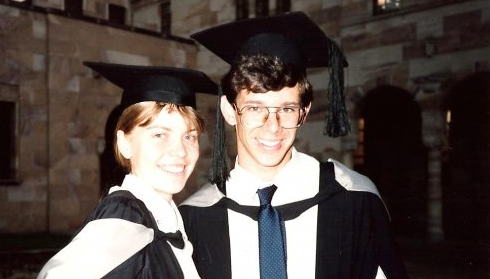
Back then I thought the degree must be old – 1981, or so I believed. These days I am the Program Convenor at the University of Queensland – but even I wasn’t too sure how old the program actually is – and indeed, is it the only degree we’ve ever offered in Accounting?
Now, apparently the answer to Brent’s question is on our website – but is it correct? Several colleagues have confidently stated to me ‘the 70s’ or ‘the 1940s’. Just last Friday it was confidently stated as ‘1961’. I personally thought it was 1934 – for reasons that will become clear.
But – to provide a more definitive basis for presenting ‘the correct answer’, it is insightful to consider the original sources. I cannot presume to provide the earliest answer to this question, or even the earliest correct answer, but I can provide an answer that is backed by research and potentially correct the record.
A process of some research is however required to identify this laudable milestone. So let’s take a look through musty internet archives.

It is well documented that a Department of Accounting was created in 1961 with its first Head of Department, Reg Gynther (Whittington & Zeff, 2001). However, it is clear that accounting qualifications at the University predated the Department of Accounting. Reg Gynther had been a part-time lecturer in accounting from 1952 at the University before his appointment as a full-time lecturer in 1959 (Whittington & Zeff, 2001), so accounting studies had been going on for some time already at that point.
The indefatigable Merle Gynther (1996, p. 339) in the Accounting History Newsletter stated that “The University of Queensland had awarded the first Bachelor Degrees in Commerce in the early 1930’s. However, from 1934 to 1958, the required Accounting and Commercial Law subjects were taught by part-time lecturers, at evening classes at the State Commercial High School and College in the city.”
As Merle was the sister of the founding head of the Department of Accounting, one might reasonably identify her as a reliable source in dating the Commerce Degree from the early 1930s – and presumably, 1934. Hence my mistaken belief.
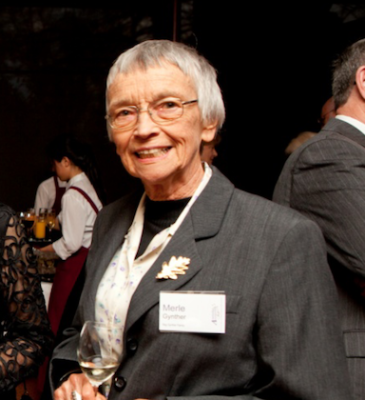
This does means that the University’s degree in accounting is much older than the department of accounting, but this is not really all that odd. After all, belt loops were not invented until after belts themselves had been invented – you don’t need a belt loop until you have a belt. Similarly, you don’t need a Department of Accounting until you have a a program to teach in accounting.
It should also be recalled that a substantive prejudice against accounting existed at the time as it was ‘not a real science’. Specifically, It was only in 1952 that accountancy was recognised as a “proper discipline for appointment of professors and scholars” by the Fulbright Commission (Murphy, 1955). Against this prejudice, Reg Gynther argued strongly (and, eventually, successfully) for a Department of Accounting.
Intriguingly, and flying in the face of today’s Australian Qualifications Framework, Reg became Head of Department when – despite having apparently lectured students in the degree for 10 years at that point – he did not himself hold a Bachelor of Commerce from the University of Queensland until 1962.
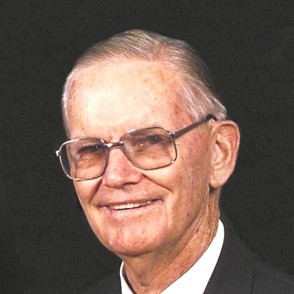
However, once he had graduated he quickly took to the life of the academic and sought further qualifications. There was a problem, however, in that nobody in Queensland had accounting qualifications beyond a Bachelor’s degree and thus there was nobody to supervise him. Potentially there were, perhaps, but nobody good enough in Reg’s eyes, maybe.
He therefore studied his Masters via University of Adelaide (1964) and his Doctorate of Business Administration at the University of Washington (1966) and thence became the state’s first Professor of Accounting (1967) (Whittington & Zeff, 2001).
Merle notes in passing that the University’s Department of External Studies had, from well before Reg’s appointment in 1959, offered Accounting and Commercial Law subjects to both BCom and an undergraduate Certificate in Accountancy (AAUQ).
So, the Department of Accounting was formed in 1961, but there were part-time lecturers (and no full-time lecturers) in a Bachelor of Commerce at least from 1952 according to Whittington and Zeff (2001). Prior to 1961, these lecturers were employed in the Department of Economics. Merle dates the Bachelor of Commerce to the “early 30s” and at least from 1934. So, 1934 seems a good candidate for the commencement of the degree.
However, there is evidence to indicate that while Merle may have been indefatigable, she was not infallible. The Bachelor of Commerce was offered much earlier than that according to reliable sources – journalists and the UQ Senate!
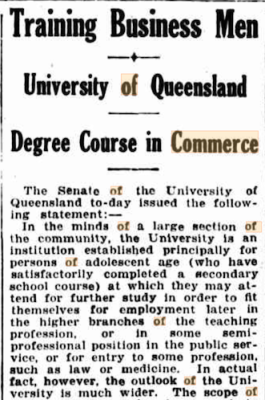
An article in The Telegraph from 1928 (Training Business Men – University of Queensland Degree Course in Commerce, 17 January 1928) reproduces a statement by the Senate of the University indicating that they had been offering a Certificate of Commerce and a Diploma of Commerce for some time. The article does not give a date from when these qualifications were offered. However, it must be between the founding of the University in 1909 and 1926 as the Senate commented that the University was in 1926 able to “go a step further” and “make arrangements for a full course in commerce leading to a Bachelor of Commerce”.
The emphasis of this Bachelor of Commerce was clearly upon accounting qualifications, as one avenue to enter the degree was “Membership by examination of an Institute of Accountants or similar body”. Similar articles are to be found from 1927 in the Toowoomba Chronicle and Darling Downs Gazette and, again, The Telegraph.
The Cairns Post of 31 May 1929 (Brought to Cairns, 31 May 1929) reports Professor Cumbrae-Stewart – on a whistle-stop tour of Queensland – saying that “Already over a hundred external students have obtained degrees under the direction of the Correspondence Study Department.” This, after noting that “the work of the external student must be confined to Arts and Commerce”, and that this practice is in contrast with the awarding of a Bachelor of Laws.
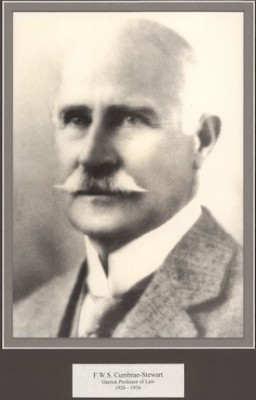
So, the Degree of Bachelor of Commerce was first offered in 1926, and it is apparent from Professor Stewart’s remarks that by 1929 external students had received the degree.
But there is, remarkably, no greater evidence than to identify two Bachelor of Commerce Graduates in 1927: Colin John Rawle Grant, and Albert Frederick Hess. These degrees were not conferred until 1928, however, according to The Brisbane Courier in 1927 (Degrees and Diplomas. State University. The Annual Examinations, 1927). Having offered the degree only from 1926, this would seem a laudable achievement by these students, although there is an earlier article identifying that this fine and diligent pair already held a Diploma at the commencement of their bachelor’s studies.
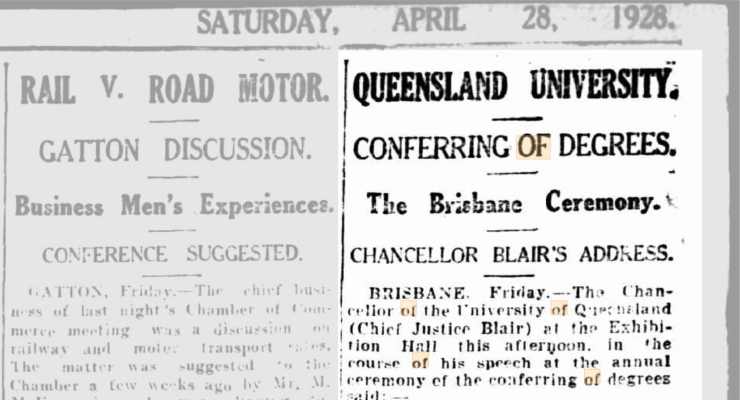
No earlier conferral of degrees can be discovered in the record. So ends the search through dusty archives – more rigorous than simply clicking ‘about me’, and a valuable journey. It seems that the Commerce degree was first offered in 1926, and its first graduates qualified in 1927 although the degree was not conferred until the ceremony of 27th April 1928 (Queensland University Conferring of Degrees, April 28 1928).
This means that the Bachelor of Commerce was one of the first pillars of the University’s existence. The Bachelor of Commerce is long-storied degree and holds a strong place in Queensland’s development into an economic mainstay. The degree may have started for “Business Men”, and it focussed on ‘technical accounting’ for its first 50 years until Reg Gynther obtained his doctorate (Whittington & Zeff, 2001) at which point the number of angels dancing on accounting statements could be discussed and debated as to whether they properly represented the true and fair state of business affairs.
Today it is the University’s tenth most popular program by enrolment number. The degree has changed markedly since then. I can at least report that systemic misogyny no longer exists in the program rules – even Reg Gynther acknowledged the distaff power in accounting back in 1968 (Gynther, 1968).
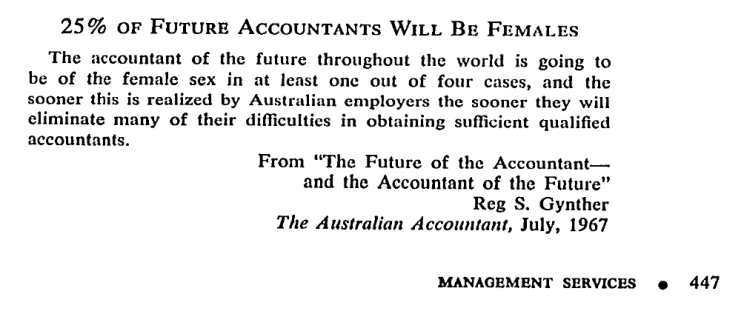
The qualification today is for a much broader suite of technical business skills. The focus on Accounting in the early days is joined by Finance, Information Systems, and Business Analytics today. However, accounting as a career remains as rewarding and just as in-demand by employers as it did five decades ago.
For the students that attain this degree – and those that employ them – it remains a stellar indicator of technical competency and business acumen in the Queensland business landscape. In 2024, as it stands, there is nearly a century of graduates that been conferred with this degree. It’s still a bit of a surprise to me that we are only two years away from the centennial of the Bachelor of Commerce. We might need to hold a party.
References
Brought to Cairns – The University of Queensland – Professor Cumbrae Stewart’s Visit. (31 May 1929). Cairns Post. Retrieved 20th April 2024 from https://trove.nla.gov.au/newspaper/article/40674390?searchTerm=%22Bachelor%20of%20Commerce%22%20%22University%20of%20Queensland%22
Degrees and Diplomas. State University. The Annual Examinations. (25 November 1927). The Brisbane Courier. Retrieved 20th April 2024 from https://trove.nla.gov.au/newspaper/article/21197764?searchTerm=%22Bachelor%20of%20Commerce%22%20%22University%20of%20Queensland%22
Gynther, M. M. (1996). The department of commerce at the University of Queensland. Accounting History Newsletter, 1980-1989 and Accounting History, 1989-1994: A Tribute to Robert William Gibson, 339.
Gynther, R. S. (1968). 25% of future accountants will be females. New York Certified Public Accountant (pre-1986), 38(000006), 447.
Murphy, M. E. (1955). Recent Research in British Accounting History. The Business History Review, 29(3), 263-276. http://www.jstor.org/stable/3111588
Queensland University Conferring of Degrees. (April 28 1928). Toowoomba Chronicle and Darling Downs Gazette. Retrieved 20th April 2024 from https://trove.nla.gov.au/newspaper/article/254030103?searchTerm=%22Bachelor%20of%20Commerce%22%20%22University%20of%20Queensland%22
Training Business Men – University of Queensland Degree Course in Commerce. (17 January 1928). The Telegraph. Retrieved 20th April 2024 from https://trove.nla.gov.au/newspaper/article/179734068?searchTerm=%22Bachelor%20of%20Commerce%22%20%22University%20of%20Queensland%22
Whittington, G., & Zeff, S. A. (2001). Mathews, Gynther and Chambers: three pioneering Australian theorists. Accounting and Business Research, 31(3), 203-233.




